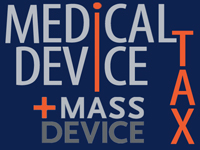
Opponents of the medical device tax returned this week to the House Ways & Means Committee to decry the 2.3% levy imposed by the Affordable Care Act.
In opening remarks for today’s hearing, Rep. Charles Boustany (R-La.) called the device tax "particularly destructive," blaming the levy for workforce cuts and delays in new product development.
Boustany appeared to agree with previous comments made by medical device makers, putting repeal of the medical device tax in the context of a larger tax reform measure. He put other healthcare reform taxes in the same boat, with their best chance of repeal tied to comprehensive corporate tax reforms.
"Any tax measures will be considered, most likely, in the context of fundamental tax reform," Boustany told reporters after today’s hearing, Healthwatch reported.
Medical device representatives attending the hearing urged Congress to repeal the tax, warning that "is threatening America’s leadership position."
"If we lose America’s leadership position in medical technology innovation – and the great jobs and all the other benefits that come with it – we will never get it back, and countless communities will never look the same," Dan Moore, chairman of the Medical Device Manufacturers Assn. and president & CEO of Cyberonics, said in prepared remarks. "None of us want to have to explain to our children one day why they don’t have the opportunity to work in the same dynamic industry as their parents did, focused on improving the human condition."
"I urge you to support the repeal of the medical device tax which is harming innovation, job creation, and most importantly, patient care," Moore added.
Rep. Boustany decried many of the taxes contained in President Barack Obama’s landmark healthcare reform act, among them insurance taxes and the employer mandate, but took time to emphasize the potential harm the medical device tax may pose to companies and the U.S.’s lead in global medical innovation.
"The new medical device tax is particularly destructive, as it targets one of the few remaining industries where America continues to lead the world in innovation," Boustany said in opening remarks. "This is an industry in which companies often go years without making a profit, hoping to survive long enough to reach profitability and introduce innovative life-saving medical products. But the new tax hits employers regardless of profitability, and has already resulted in layoffs and additional delays in new products reaching the market."
The House Ways & Means Committee has been favorable to medical device tax repeal efforts in the past. In May 2012 the committee swiftly passed a repeal bill in a 23-to-11 vote, sending the bill to a floor vote, but the decision wasn’t without conflict.
Committee Democrats at the time expressed concern about how to make up for the $30 billion the medtech levy is projected to raise over 10 years, but were outvoted by the majority, with 2 of their own joining Republicans in supporting repeal.
The issue of a so-called "pay-for" to make up for the lost revenue the medical device tax is projected to generate has been a sticking point for many Democrats, hampering repeal efforts in the Dem-led Senate.
A pair of medtech tax repeal bills introduced last month have 203 co-sponsors in the House of Representatives, 25 of them Democrats, and 28 co-sponsors in the Senate, 4 of them Democrats.
Lobbying groups such as MDMA and AdvaMed have vowed to continue fighting to repeal the tax, which took effect at the start of the year.
AdvaMed said late last month that it’s 2013 agenda demonstrated its intention to "double down" on efforts to repeal the levy.
MDMA president & CEO Mark Leahey said in prepared comments today that those efforts are gaining traction among lawmakers.
"While each and every day is a challenge for medical technology innovators to balance the impact of the device tax with the goals of improving health care, bipartisan momentum continues to build for efforts to repeal this policy," Leahey said. "One job lost is one too many, and the thousands lost to date are devastating. As the real world consequences of the tax surface, more Members of Congress are taking notice."

